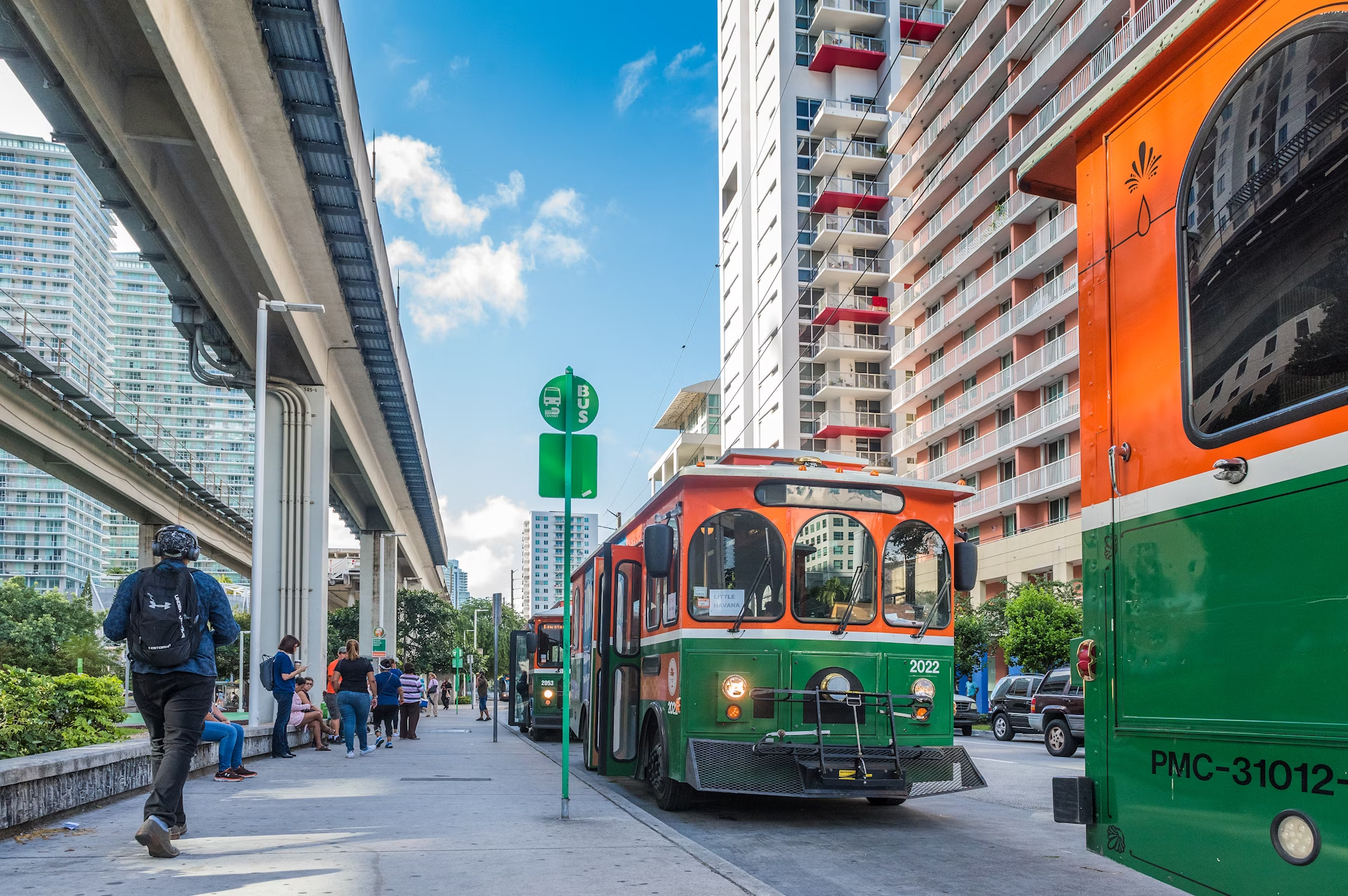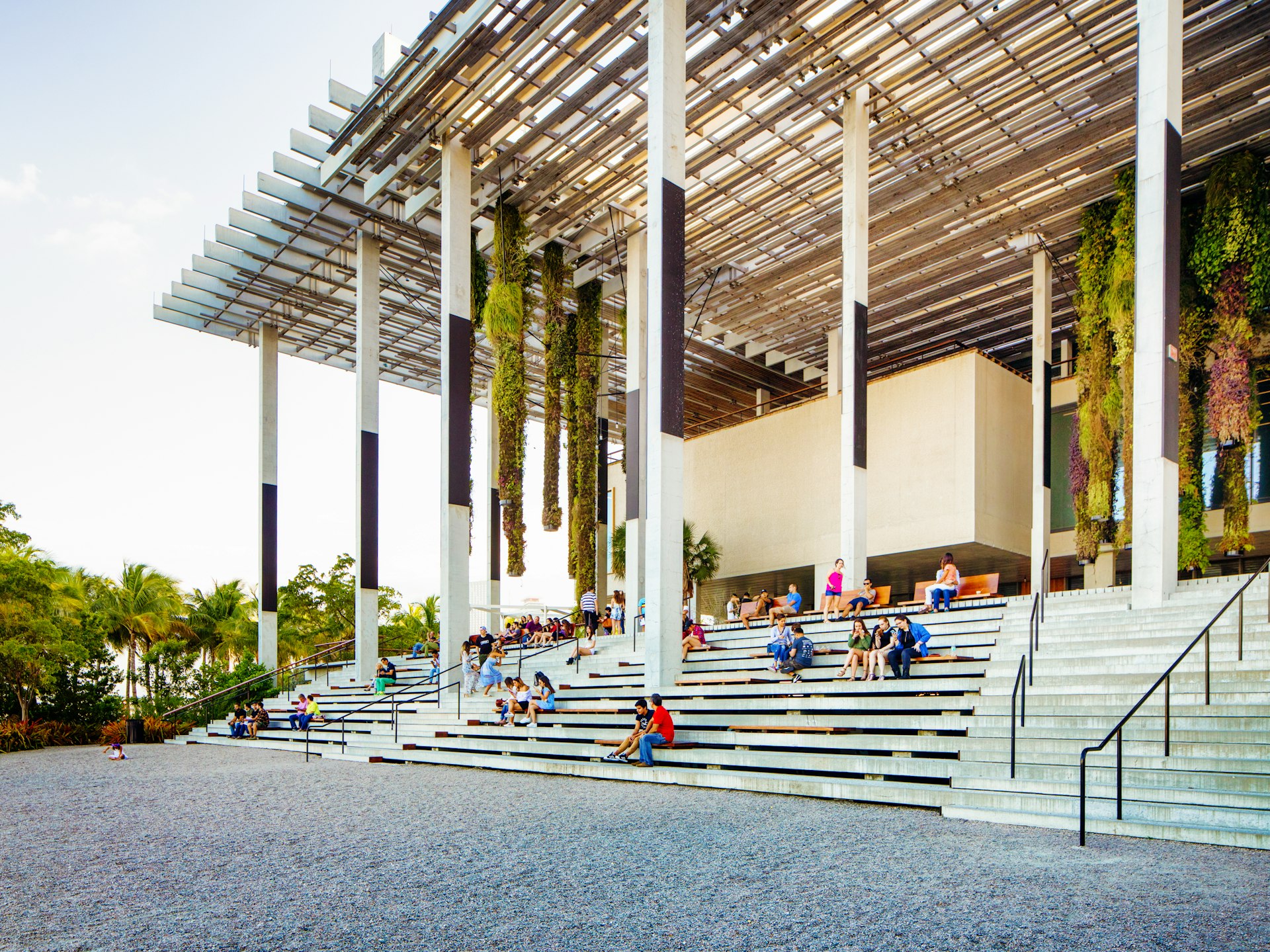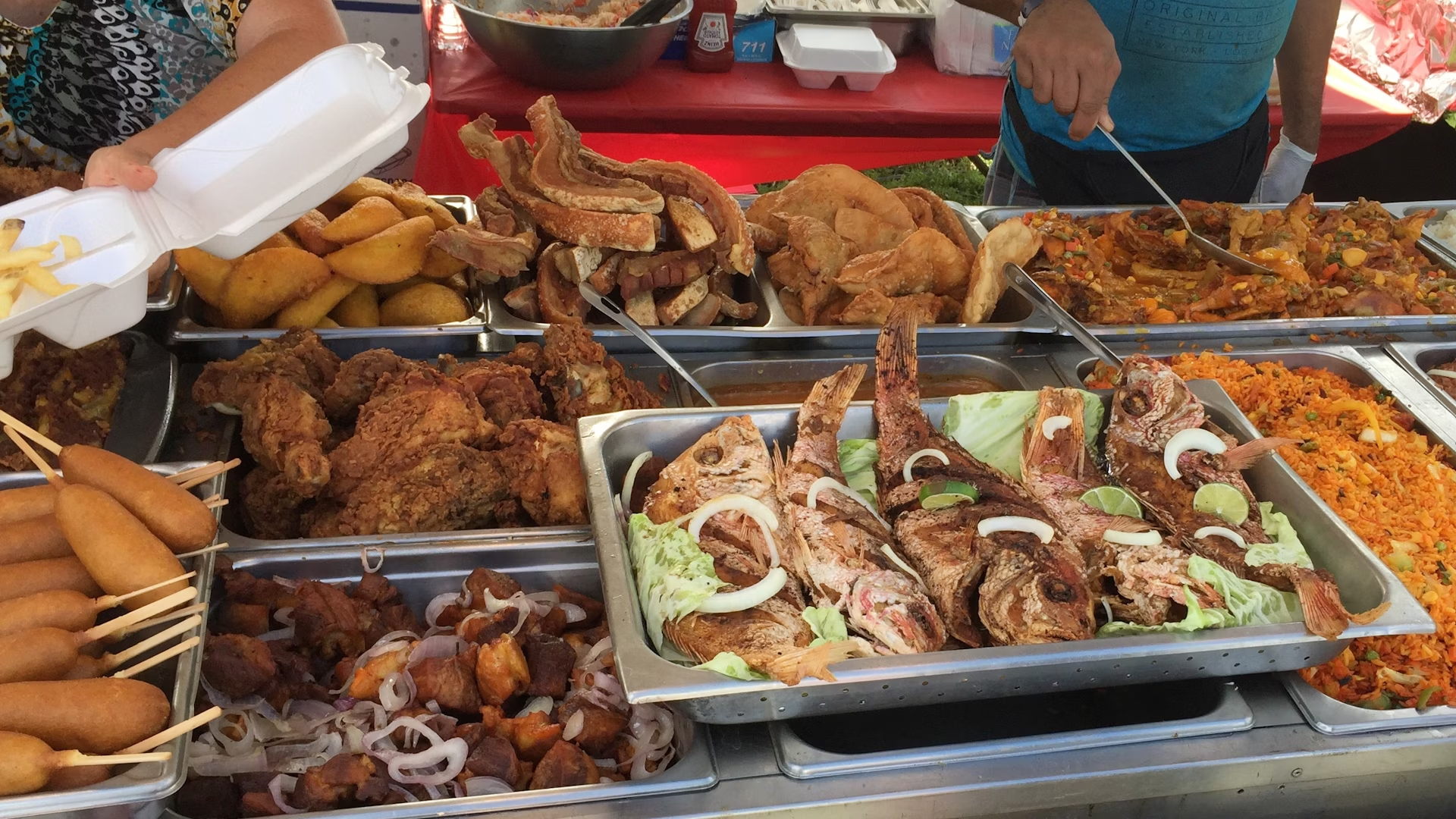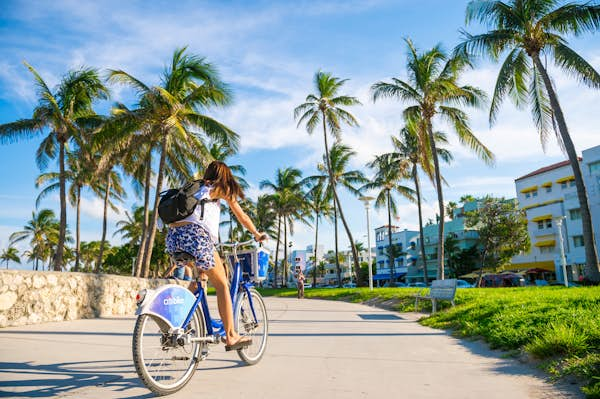How to visit Miami on a budget
With its ever-growing skyline and mansion-laden private islands, Miami can come across as a playground for the rich. But does it really require a hefty bankroll? It just depends on what kind of vacation you’re looking for.
Sure, you can spring for the Fontainebleau at $400 a night, but you can just as easily find a SoBe hostel or even a standard hotel room for a fraction of that price. And while there are plenty of James Beard Award-winning restaurants to choose from, some of the city’s top dining experiences can be enjoyed for $20 or less.
Budget-conscious travelers can also get around Miami without going broke and still have a great time. There are several public transit options available to those with a smidge of patience, and they offer the chance to people-watch and get a glimpse of a Miami that most tourists don’t even notice. And when it comes to free experiences, the city is chock-full of them if you know where to look.
Here’s how to enjoy Miami on a budget.
Daily Costs in Miami
- Hostel room: $30–90
- Basic room for two: $150–300+
- Self-catering apartment (including Airbnb): $80–200+
- Public transit ticket: $2.25
- Cafe con leche: $2–4
- Sandwich: $15
- Dinner for two: $40–60
- Beer at the bar: $8
Average daily cost: $175
Plan to visit in peak hurricane season if you can
If your vacation time is flexible and you’re feeling brave, lucky or both, consider looking for flights in August or September. While hurricane season starts up in June, it really takes off during this period. Coupled with the return of the school year, the intense heat (August is especially roasty) and the near-daily afternoon showers, it’s also the cheapest time to visit Miami. The good thing is that hurricanes don’t just appear overnight. If one does make its way to the city, you’ll have time to make alternative plans.
Also, be aware that even when Miami is shown in the trajectory of a hurricane, by the time it finally reaches the city, it’s often much weaker than initially anticipated. This means you might just experience a full day of high winds and rain but not a full-on hurricane, with the bonus being that the weather is generally quite pleasant (cool, dry and sunny) post-storm.
Find out the best time to visit Miami for your perfect vacation
Shop around for your flight (MIA isn’t always the cheapest)
Booking your flight as early as possible is always recommended, but that’s not the only way to save. While Miami International Airport (MIA) has plenty of flight options, it can actually be pricier than the next closest airport: Fort Lauderdale Airport (FLL). Yes, it’s a bit of a hike from Miami, but it’s always wise to keep an eye on flights for both airports.
Bonus: the Tri-Rail is accessible from FLL, which you can use to get down to Miami if you’ve opted against renting a car.

Use free public transit options when available
As a major commuter town, Miami is best-traversed from the comfort of a rental car. However, if you’re not looking to wander too far from your hotel or hostel, you might be able to get away with using public transit. Moreover, Miami has several free public transit options to choose from (and the rest are relatively low-cost as well).
City of Miami Trolleys run in a variety of Miami neighborhoods, including Wynwood, Coconut Grove, Little Havana and Allapattah. Other areas of Miami-Dade run their own free trolleys, from Miami Beach to Coral Gables.
If you find yourself downtown, the cheapest way to get around is undoubtedly the totally free-of-charge Metromover. It’s slower-moving than the Metrorail (the city’s somewhat limited but still-useful train option), but it can give you some excellent views of the city and Biscayne Bay. You can take it anywhere from the Adrienne Arsht Center to Museum Park (home to the Pérez Art Museum Miami and Frost Museum of Science), Bayside Marketplace to Bayfront Park, and as far south as Brickell (home to plenty of high rises, restaurants and bars).
Want to explore further? Take the Metrorail and head south to Coconut Grove (you’ll need to transfer to a bus or Uber to get close to the shops and restaurants); South Miami or Dadeland (another popular shopping center); or north to Allapattah, a historically lower-income neighborhood currently seeing a bit of a gentrification-based renaissance and now home to attractions like Superblue and the Rubell Family Art Collection.
Hit the ground running with our Miami transportation guide
Rent or borrow a bike to get around
While Miami is not known for its huge biking culture, it’s still a solid way to get around a smaller neighborhood. And don’t worry, you don’t have to bring your bike along with you.
Citi Bikes are the local rent-a-bike option. They’re readily available all across Miami Beach and all along the coast on the mainland from Little River down through Wynwood, Downtown, Brickell and to Coconut Grove. At $7.95 per hour (or $24 per day), it’s a relatively inexpensive way to see the city up close, sans parking headaches.
Oh, and finally, check if your hotel has a bike-borrowing system – you’d be surprised how many offer this as an amenity.
Skip the ocean view hotel rooms
Sure, an ocean-view room can be worth it, but is it always necessary? Clearly not. And if you’re on a tighter budget, you’ll likely want to shop around and stay at either a hostel or a smaller boutique hotel. Any hotel with ocean (or skyline) views will generally upcharge anywhere from $30–80 for the scenic outlook. Save that money for Miami’s other attractions. You can always try to book a hotel that has rooftop access so you can still snag some great views (and great selfies) without the extra cost.

Take advantage of free museum days
Miami is home to a plethora of museums, and over the years, they have become increasingly accessible and affordable. The Pérez Art Museum, Gold Coast Railroad Museum, The Wolfsonian and The Bass are just some of the museums offering free days at least once a month.
If your travel dates don’t align, there are plenty of other museums that are free year-round, including the Institute of Contemporary Art, the Frost Art Museum and the Lowe Art Museum. Travelers with disabilities can also enjoy certain museums free of charge, from HistoryMiami to MOCA NoMi (with free sensory days once a month at the Miami Children’s Museum).
Grab any necessities at your nearest grocery store
Pharmacies like Walgreens and CVS are a dime a dozen in Miami, but beware of those located in touristy areas like South Beach, as their prices tend to be higher. So where can you go to get a better deal? No doubt you’ve heard the locals sing the praises of Publix. Find your nearest store for lower prices on necessities including deodorant, sunscreen and toothpaste. Depending on where you are in town, you can also pop into Sedanos or Winn-Dixie for even better prices.
Venture into your nearest Latin food-by-the-pound spot…
Of course, we’d be remiss if we didn’t mention where to get cheap eats in the Magic City. While you might want to flex your credit card for a night at one of the city’s many award-winning restaurants, you can still eat well without going broke at the nearest Latin food-by-the-pound restaurant. Don’t be confused by the name, though; these places aren’t always weighing your food. What they are doing is loading up a styrofoam container to the brim with all sorts of yummy goodness – the kind that’s also excellent reheated.
Get your fill of Cuban cuisine like arroz con pollo (chicken and rice) at Palacio de los Jugos, or venture into a Nicaraguan eatery called a fritanga to taste delicious gallo pinto (a rice and beans dish), carne asada (grilled marinated steak) and fried cheese.

…or pick up legit Latin food from a street vendor
If you’re looking for something a little less dense, you can always check out local street food vendors to see what cheap, tasty treats they’ve got. Yes, some food trucks nowadays sell fusion foods that are pricier than you might expect, but many remain reasonably priced. El Bori is a food truck serving up delightful Puerto Rican bites like empanadillas (turnovers), cheese dogs and alcapurrias (fritters) for under $10. Smaller food carts selling Colombian arepas de choclo (sweet corn cakes) are often a staple at tourist hot spots and local events, and you can usually grab something yummy for around $5.
Seek out free festivals, art crawls and more
The party is always on somewhere in Miami and, more often than not, you won’t even have to pay. If you’re on the beach and seeking cheap nighttime activities, check out the Miami Beach Culture Crawl on the third Thursday of the month. It features different activities each month, from backstage tours to exhibition openings and more. Viernes Culturales in the Little Havana neighborhood is another arts and culture crawl where you can check out vendors, dance to live music and really get a taste of Cuban-American cultura. Speaking of which, Calle Ocho, which takes place every March, is one of the largest music festivals in town, and it’s free of charge.
Music lovers should also be aware of the WALLCAST Concerts and the SoundScape Cinema Series staged just outside of the New World Symphony. And don’t forget all the farmers markets, author events at places such as Books & Books, and more totally free events going on year-round.
Keep planning your trip to Miami
Looking for more money-saving tips? These experiences don’t cost a thing
Soak up the sun on Miami’s best beaches
Explore beyond the city with these day trips from Miami



